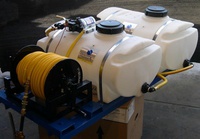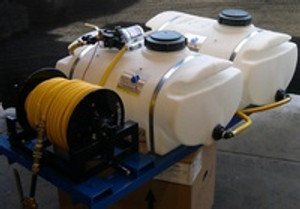Pros & Cons of Electric Power Sprayer Motors
Posted by Andrew Greess on Feb 10, 2015
This post is about power sprayer rigs. If you’re interested in backpack sprayers, be sure to check out our selection of electric backpack sprayers.
The first question to consider is whether to buy a gas or electric motor sprayer. I will highlight the pros and cons of each:
Pros of an electric battery-powered pump sprayer motor:
Lower cost. Electric sprayers generally are simpler, have fewer parts, and cost significantly less than gas-powered ones. Usually, the battery sprayer motor and pump are a single unit, which costs less (than gas-powered) and doesn’t require additional assembly, which saves labor and cost.
Less space: These sprayers generally take up less space in a vehicle. The electric power sprayer motor and pump are usually significantly smaller than a gas motor and pump assembly. The smaller footprint has a number of advantages:
- Ability to use a smaller vehicle. Smaller vehicles generally cost less to purchase and operate.
- More space for other equipment and products.
Less maintenance: Electric sprayers have fewer moving parts and often have simpler plumbing. This means less can go wrong, fewer parts to maintain in inventory, and easier maintenance.
Greener image: Electric battery-powered pump sprayer motors give operators a greener image. Because they don’t use gasoline, the operator can claim to be a greener company that doesn’t use gas-burning engines. There’s no need to store gas and oil.
Quieter: Electric motors make almost no noise compared to gas-powered sprayers, which can be noisy. This can allow the operator to work earlier and later in the day without disturbing customers and neighbors.
Cons of an electric sprayer motor:

Lower output: Sprayers powered by electricity generally have lower output or volume (as measured in gallons per minute or GPM) than gas-powered sprayers. This means battery sprayer motor pumps generally aren’t suited for high-volume jobs such as termite pretreats, large weed pre-emergent jobs, or driving a large boom (e.g., golf course fairway sprayer).
Lower pressure: battery-powered pump sprayer motors generally provide lower pressure than gas-powered sprayers. Pressure is measured in pounds per square inch or PSI. Electric pumps aren’t suited for high-pressure jobs such as spraying tall trees or long distances. Longer hoses can be a problem for the lower-pressure battery-powered sprayer pump to push through. Occasionally, spray hose problems can occur with low-pressure electric pumps. Two examples:
- The spray hose is old and mushy. It swells to absorb pressure, and there’s no pressure left to push the water through the hose.
- The spray hose is wound too tightly on the reel, and the pump doesn’t have enough pressure to push the water through the squished-down hose.
Volume pressure tradeoff: In addition to generally having less volume and pressure than gas-powered pumps, electric sprayer pumps usually have a significant tradeoff between volume and pressure. You can find a higher-pressure electric pump, but it will be lower volume (and vice versa). On the other hand, gas-powered pumps are available in high volume and high pressure if needed – diaphragm pumps, for example.
Transferring sprayer to another vehicle: Electric pumps are usually wired to the truck battery, so it’s more involved to transfer the spray rig to another vehicle – the vehicle requires service, for example. The battery-powered pump sprayer rig must be wired to the battery of the new vehicle. Contrast this to a gas-powered sprayer in which the power source is part of the sprayer. It just needs to be transferred to the backup vehicle. No wiring is required.
Fail points: Experience shows that all 12-volt electric sprayer pumps commonly used for pest and weed control applications have weak points that fail. This book doesn’t address or recommend vendors or models, but generally speaking:
- Smaller pumps are more reliable and draw fewer amps, which means they won’t kill the truck battery. The downside to these pumps is the pressure demand switch is usually a weak point that fails about once a year. The pressure switch senses demand (i.e., you’re squeezing the spray gun trigger) and turns the pump on. The constant off and on takes its toll on this switch, which is usually the first component to fail. This isn’t a reason not to purchase an electric battery motor sprayer; it’s merely maintenance to be planned.
- The higher-volume pumps draw more amps and require one of the following:
- A separate battery in the vehicle to drive the pump;
- Running the vehicle while spraying so the battery doesn’t die; or
- Spraying for shorter periods and then starting the vehicle, so the battery doesn’t die.
QSpray.com is your trusted resource for professional pest control and landscape equipment, parts, and supplies. Learn more about battery-powered pump sprayers at Qspray.com today.

